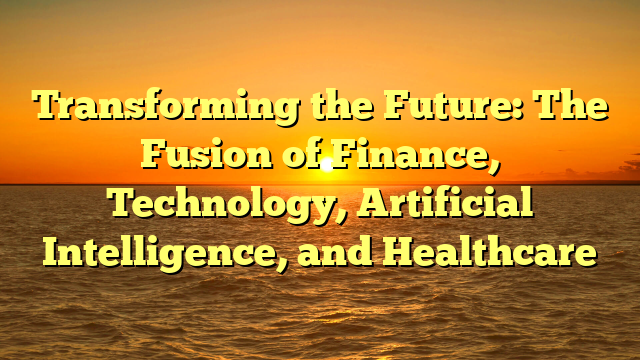—
As our world continues to transform at an unprecedented pace, the confluence of finance, technology, intelligence, and healthcare is powering a new paradigm. These once separate sectors are now intertwined, building the foundation for a more resilient future.
The Financial Sector Meets Technology
The financial industry have integrated technology to automate their operations. From digital wallets to fintech platforms, the financial landscape has evolved significantly.
AI algorithms are now used to predict market trends. These systems analyze massive datasets in real time, offering insights that were once unavailable.
Fintech companies like Revolut are challenging conventional banking by offering user-friendly financial services that are customized to a digital-first generation.
The Role of Artificial Intelligence in Finance and Health
Artificial Intelligence is disrupting both the finance and healthcare sectors. In finance, AI improves decision-making, reduces human error, and improves efficiency. In healthcare, AI is being used for predictive analytics.
Imagine an AI system that can scan thousands of medical records and identify early signs of diseases such as cancer or Alzheimer’s. These intelligent tools minimize the need for traditional procedures and accelerate recovery time.
Similarly, in the financial world, AI trading bots can respond to market changes in milliseconds, allocating funds faster than any human ever could. This efficiency is a game changer for investors and financial institutions alike.
The Rise of Smart Health Technologies
Smart health gadgets have revolutionized personal healthcare. Devices like Garmin monitor everything from sleep patterns to hydration.
These devices not only motivate individuals to take control of their health, but also collect valuable data that can be used by healthcare providers to personalize treatments.
Online doctor appointments have also become popular, allowing individuals to connect with doctors from the comfort of their homes. This trend was fast-tracked by the COVID-19 pandemic, but continues to grow due to its accessibility.
Financial Intelligence and Wellness
Financial literacy is gaining momentum. With the rise of AI-driven financial tools, people can now manage their spending, set budgets, and save smarter using platforms that are interactive.
This not only supports financial health but also reduces stress — a key contributor to poor physical and mental health. Studies show that people who manage their finances effectively are more likely to enjoy better overall well-being.
Smart budgeting tools like YNAB help users understand their money and make smart decisions. When combined with AI, these platforms become even more powerful.
Data Security and Ethical Concerns
With all these advancements come new challenges. Information protection is a major concern as more personal and financial data is stored online. Gerhanatoto , especially, is confidential and must be protected against breaches.
AI, too, raises philosophical questions — such as how decisions are made, who is accountable, and how bias in data can lead to unfair outcomes. Transparency and regulation will be key to ensuring that technology serves all people fairly.
A Unified Future
The fusion of finance, technology, intelligence, and health is not just a trend — it’s the future. Together, they are shaping the path for a world where financial stability, smart technologies, intelligent systems, and well-being coexist.
As we move forward, it’s essential to welcome these changes with a balanced approach. Governments, businesses, and individuals must work together to ensure these innovations are beneficial, inclusive, and resilient.
Conclusion
Ultimately, the interplay of finance, technology, intelligence, and health is fueling a new era of progress. The possibilities are boundless — from AI doctors and smart wallets to digital investments and wearable health trackers.
Harnessing the power of these fields, we can create a future that is not only health-conscious, but also equitable.
Transforming the Future: The Fusion of Finance, Technology, Artificial Intelligence, and Healthcare
